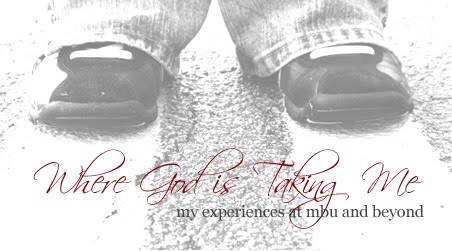Wednesday, July 28, 2010
Tribute to Dad
Monday, July 26, 2010
On Reserve Battery
This evening Dad, Rachel, Jerry, and I were outside as my dad replaced a portion of the brake line in Rachel’s Beretta and began bleeding the air out of the lines. As I observed his twisting socket wrenches and his tenacious removal of the left front, I was able once again to relish in a thunderstorm’s approach. I listened to the low rolls of thunder and eventually felt the cool downdraft blow from the west, carrying with it the scent of refreshing rain. As I type now, it is here upon us and threatens to snuff our electricity.
I am thankful for the handymen and mechanics in my family. My dad and uncles, Ronnie, Larry, and Gerald, have put in many hours working on cars. Their auto repair ingenuity has saved us from many a burdensome cost. I will recount the recent events leading up to my current reflection soon, when I can charge my laptop without threat.
Thursday, July 22, 2010
Links Between The Fellowship of the Ring and the Gospel
Friday, July 09, 2010
Love the Brotherhood. Watch Yourself and the Teaching.
I give thanks to my God always for you because of the grace of God that was given you in Christ Jesus, that in every way you were enriched in him in all speech and all knowledge— even as the testimony about Christ was confirmed among you— so that you are not lacking in any spiritual gift, as you wait for the revealing of our Lord Jesus Christ, who will sustain you to the end, guiltless in the day of our Lord Jesus Christ. God is faithful, by whom you were called into the fellowship of his Son, Jesus Christ our Lord. (1 Corinthians 1:4-9)
Thursday, July 08, 2010
Sin, Grace, Jude, and James
Blessed is the man who remains steadfast under trial, for when he has stood the test he will receive the crown of life, which God has promised to those who love him. Let no one say when he is tempted, “I am being tempted by God,” for God cannot be tempted with evil, and he himself tempts no one. But each person is tempted when he is lured and enticed by his own desire. Then desire when it has conceived gives birth to sin, and sin when it is fully grown brings forth death. (James 1:12-15)I listened to about half of a sermon by C.J. Mahaney on Jude ("Contend," part two of two in Jude series) while I walked. Shortly before finishing the mile I realized that Mahaney's words directly pertained to me. One of his points was from v. 21 ("keep yourselves in the love of God..."). The sub-points that followed answered the question, how? From the text, he answers (1) build up yourselves in faith (e.g., preach the gospel to yourself every day), (2) pray in the Holy Spirit, and (3) wait for the Lord's mercy. Okay, so how am I doing with these? Epic fail.
Do not be deceived, my beloved brothers. Every good gift and every perfect gift is from above, coming down from the Father of lights with whom there is no variation or shadow due to change. Of his own will he brought us forth by the word of truth, that we should be a kind of firstfruits of his creatures. (James 1:16-18)
If you neglect this imperative, to keep yourselves in the love of God,... it will have a subtle but gradual and inevitable effect on your soul. Yes, it will. And eventually what is subtle will become obvious because if you neglect this passage [Jude 20-22] and the application of this passage, you neglect this passage to the detriment of your soul. And eventually you will reap. I know because I have neglected this passage at times and then experience the dullness in my soul, diminished affections for the Savior, diminished desire to read His Word. I know what it's like. I look in my soul and say, "You're not as affectionate and passionate as you once were."... If your heart is dull or hard, you arrive there by a daily neglect of this verse... You can keep yourself in the love of God by doing, by the grace of God, what you should have been doing all along--preaching the gospel to yourself, praying, and waiting... Gradually, over a period of time, you will know a restored affection for the Savior.
Know this, my beloved brothers: let every person be quick to hear, slow to speak, slow to anger; for the anger of man does not produce the righteousness of God. Therefore put away all filthiness and rampant wickedness and receive with meekness the implanted word, which is able to save your souls. (James 1:19-21)




